An Oral History of the Cult Classic ‘EuroTrip’

Since Alec Berg, David Mandel and Jeff Schaffer were all teens in the 1980s, they grew up watching the same kinds of movies. Sex comedies like Weird Science and Real Genius were wildly popular back then, and they were one of the things the trio bonded over when they first met at Harvard.
After writing for The Harvard Lampoon, they began working in television, eventually landing in the Seinfeld writers’ room, where they wrote some of the most memorable episodes of the show’s final seasons. After Seinfeld ended, they transitioned into film, often working as script doctors to punch up comedies. But they wanted to direct their own movies, too. When it came to what kind of movies those would be, they went back to the sex comedies they’d watched as teens. Out of that came Ugly Americans, which would later be renamed EuroTrip in a very deliberate attempt by DreamWorks to trick the audience into thinking they were buying tickets to a Road Trip sequel.
Don't Miss
But the ruse didn’t work. When EuroTrip debuted on February 20, 2004 it finished fifth at the box office, just behind the Ray Romano/Gene Hackman flop Welcome to Mooseport.
It was a gut punch for Berg, Mandel and Schaffer, but they all landed on their feet, working on Curb Your Enthusiasm afterwards. They’d go on to other hits too. For Berg, there was Silicon Valley and Barry; for Mandel, there was Veep and White House Plumbers; and for Schaffer, there was The League and Dave. But as they presided over the next phases of their careers, something was happening with their theatrical flop. EuroTrip was being viewed in basements late at night by the kids who were too young to see it in theaters, much the same way that Berg, Mandel and Schaffer had consumed their beloved 1980s sex comedies.
EuroTrip’s cult status also grew thanks to the very specific drumbeat of “Scotty Doesn’t Know,” the song from the film about the hero’s ex-girlfriend cheating on him. Performed by the Boston-based rock band Lustra — and lip-synced by Matt Damon in the film — “Scotty Doesn’t Know” gradually became a hit, and in 2023, Rolling Stone ranked it number two on its list “Fake Bands, Real Songs: The 50 Best Tunes by Made-Up Musicians.”
While Berg, Mandel and Schaffer were always proud of the film, it’s been especially vindicating for them to see EuroTrip become a hit after their own studio hated it, critics were divided on it and audiences barely showed up to see it. So, here to take it all off and reveal everything about the film on its 20th anniversary, are Berg, Mandel and Schaffer.
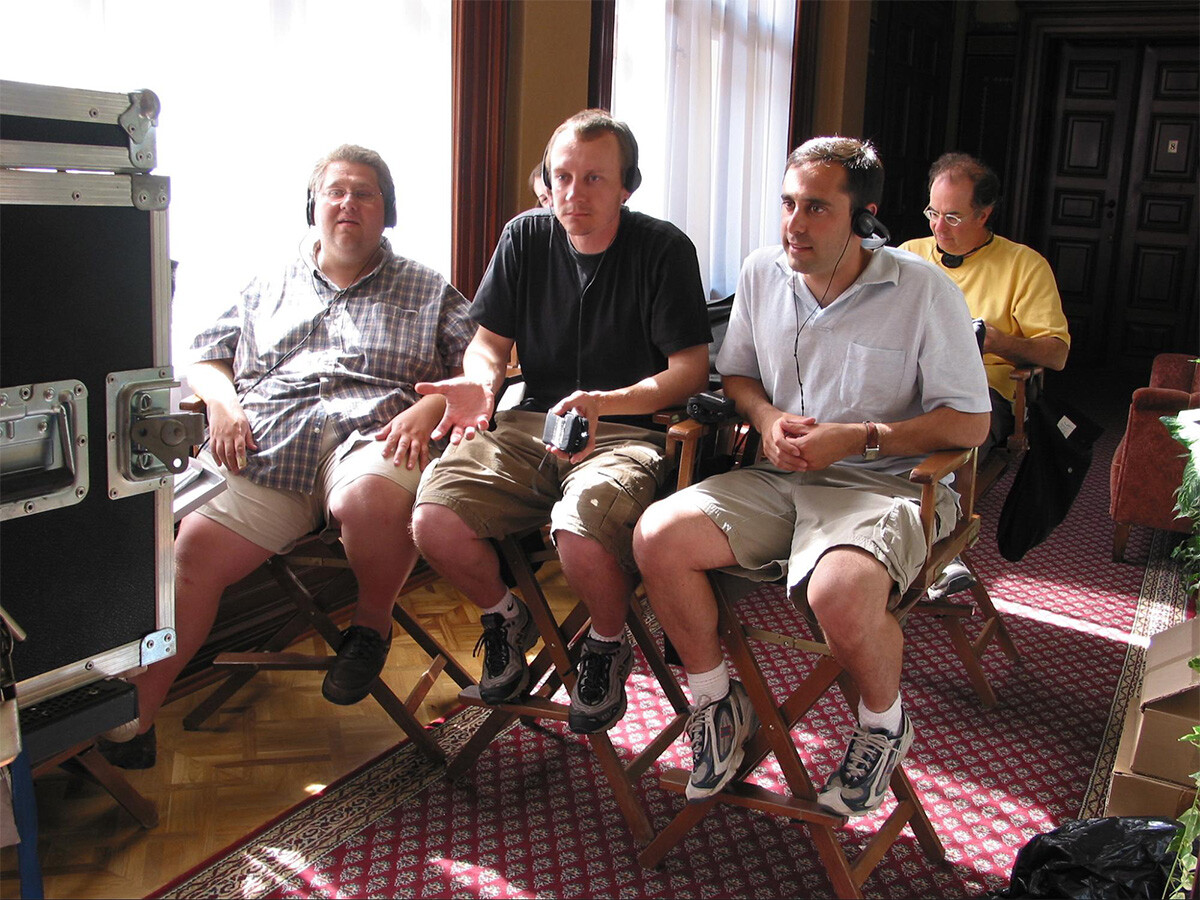
Before There Was ‘EuroTrip,’ There Was ‘Ugly Americans’
David Mandel, writer/producer/(uncredited)director of EuroTrip: In 2002, Jeff, Alec and I were doing a lot of movie rewrites. We were also getting invited to look at rough cuts where they’d already made the movie, and they were asking us, “How do we fix this?” So, we came to this conclusion: “Boy, comedy directors aren’t great, and it doesn’t seem to take a lot to be a comedy director. The bar is low — why not us?”
Then, we tried to, scientifically almost, write a movie that we thought we could sell and that was cheap enough where they’d let us direct it. Those were the parameters we constructed for ourselves.
Jeff Schaffer, writer/producer/director of EuroTrip: Conceptually, we wanted to make a movie that was like the movies we grew up watching.
Alec Berg, writer/producer/(uncredited)director of EuroTrip: You could have stopped after just “Conceptually, we wanted to make a movie.”
Schaffer: Yes, that’s true. But we wanted to make a movie where you’d steal your parents’ liquor — or your friends’ parents’ liquor — and go into the basement and watch a funny, R-rated sex comedy.
Mandel: There were also two other things that happened in the lead-up to us writing EuroTrip. One, there was a brief moment where they talked to us about writing the sequel to American Pie, and we pitched them going to Europe. No one listened, but that was in our brains somewhere. Second, we were doing a rewrite of a movie called Out Cold, which is a snowboarding movie. We did a one-week rewrite of it, and there was this hot tub scene we came up with. It made us laugh so hard that, at some point we said, “This is too good to give to Out Cold, we need to keep this and put it in our movie that doesn’t exist.”
Soon, we got to writing it while we were doing rewrites for The Cat in the Hat at Imagine. We did what we always do and gathered all the funny stories we’d ever heard from friends. They weren’t our stories because the three of us all graduated and became comedy writers, while our friends went to Europe and had a fun eurotrip of their own. What we had was their stories because, again, we didn’t have any stories of our own.
Berg: Every one of them had had a run-in with a creepy Italian guy on a train and got felt up. It was also about the iconic things someone might do while going to Europe, like a nude beach and going to Amsterdam and getting stoned, seeing the red light district. What are the European backpacking touchstones? We kind of reverse-engineered a movie out of that. You can tell by watching EuroTrip that this movie didn’t come out of some deep need to shed light on the human condition.
Mandel: I mean, I hate to say it, but it was very joke-sequence-driven. “What could we do in London?” “Let’s do soccer hooligans.” Jokes and cities were very interconnected. We weren’t going to do a city if we didn’t have a great joke, and we weren’t going to do some great joke if it didn’t fit in a city.
When it was finished, it went out into the world as a spec script, and it went out with our lawyers and representatives saying, “They want to make this.” As the bidding war heated up, because it was a hot spec script, it went to who gave us a path to production, which meant, in under a year, we would be making this movie. That was the entire goal of EuroTrip — for us to direct a movie. That was everything to us.
Schaffer: Also, as it was conceived and when it went out into the world, the movie was called Ugly Americans. It was never called EuroTrip. EuroTrip isn’t anything we would have called it in a million years. It became EuroTrip in post-production.
Mandel: A lot of studios went after it, including Ivan Reitman on behalf of DreamWorks.
Berg: This was Ivan Reitman, so we were very much in awe of him.
Mandel: Yes, but we went with DreamWorks and Ivan because we got our path to production. We got a really nice deal for us to write and direct, and more importantly, they had 12 months to put it into production or we got it back. That was huge.
That was June of 2002, and we were shooting by the following February in Prague.
Beautiful Americans, Finding the ‘EuroTrip’ Cast
Mandel: We cast Michelle Trachtenberg early on because she was the closest thing we had to a name. She’d already had a career.
Berg: She was just a pro.
Schaffer: Travis Wester as Jamie had a real cockeyed optimism to him. You could smash him down, and he kept getting back up. Jacob Pitts came in and read for Cooper, and he had such an off-kilter read. He made us laugh in ways that we didn’t expect.
We found Scott Mechlowicz a week before we were leaving for Prague. He got the part of Scott because he was handsome, he was fun and he was able to win some. You don’t want a soft center with a bunch of stuff just put upon him. You want him to be able to give as much shit to Cooper as Cooper is giving to him.
Mandel: As for Jessica Boehrs, who played Mieke, Scott’s love interest, we found her once we were overseas.
Schaffer: She was in a soap and had a music career. Once we saw her, it was done.
Also, we were shooting this in 2003 in the Czech Republic. There was a war going on and there was SARS, so people weren’t dying to fly out. We flew in Steve Hytner as the green fairy because we all worked with him as Bania on Seinfeld, but half the people that are in the movie are in it because they were shooting another movie in Prague. That’s how we got Lucy Lawless and, most notably, Matt Damon.
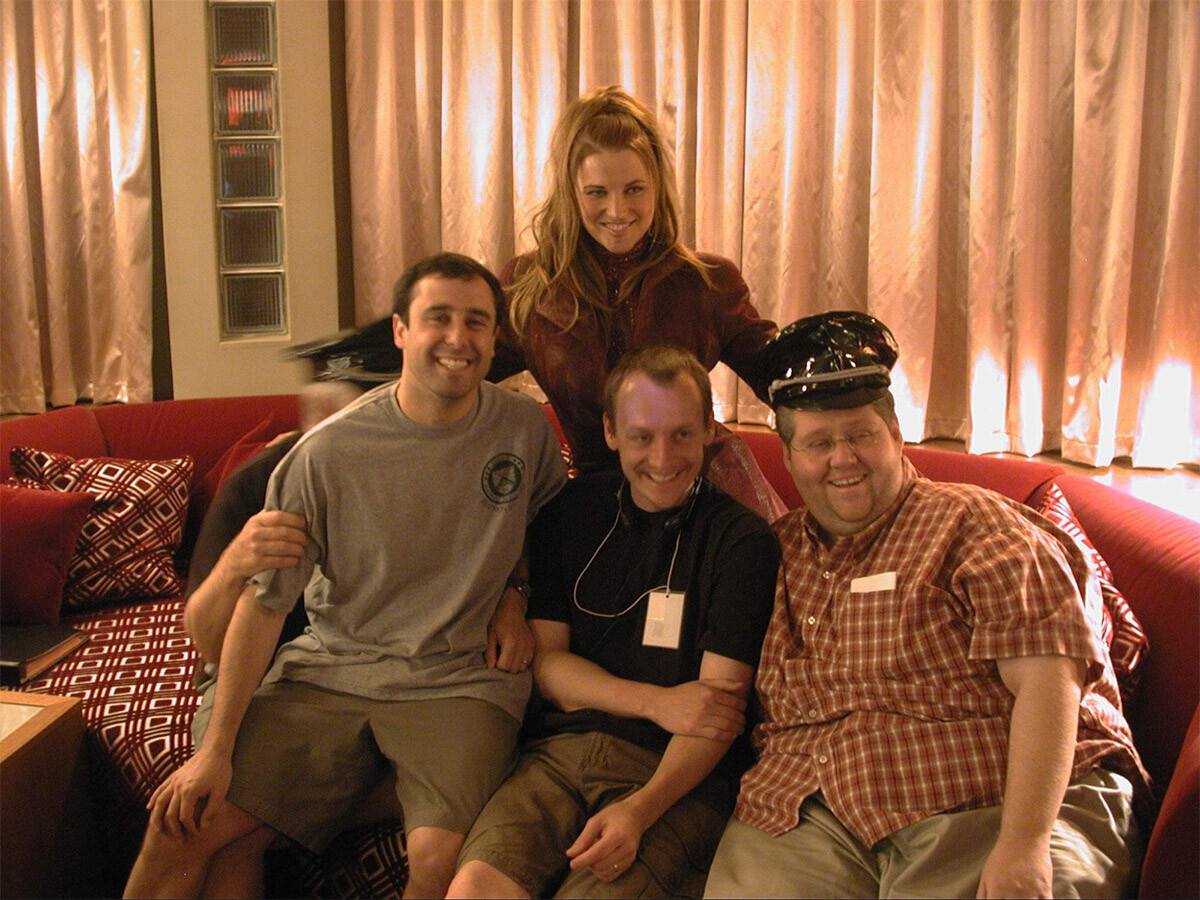
Czech Your Bags: Filming in Prague
Berg: Every single thing in the entire movie, except for the nude beach, was shot in Prague, or within an hour of Prague.
Schaffer: Every extra is a Czech extra, including for the scenes in America. Bert, Scott’s younger brother, is from Uzbekistan.
Berg: When you hire an American actor, they work under SAG rules. So if you hire an American actor to work in Europe, you have to pay them for every day that they’re traveling. You also have to pay for first-class travel and their hotel. In other words, to get somebody to come from America to deliver one line, it’s like $20,000.
For a while, we had this running joke about the kid who played Bert. We paid him like $150 to be in the movie. So as a joke between us, a “Bert” was a unit of currency. “How many Berts will it take to put a sign on that wall?” “Oh, that’s six Berts. I don’t think we can afford that.”
Schaffer: Another thing that’s worth mentioning is that, even though I’m credited as the director, I’m not the director. All three of us are the director. What happened was, the Directors Guild gets super uppity about multiple people directing, and they just wouldn’t let us have it. Instead, we had a semi-Buddhist Czech P.A. with a long rat tail named Jaroslav Jablonský pick our names out of a hat. We filmed it and put it on the DVD; it’s called “How to Pick a Director.”
The Sweet Sounds of ‘Scotty Doesn’t Know’
Mandel: Even for the scene set at a Ohio high school graduation party, we shot in Prague. We must have scouted a million houses before we found that house. It was the only house in Prague with a backyard.
Schaffer: For that party, we had to fly in red Solo cups. They don’t exist in Europe.
Berg: We had a mostly Czech crew, and we sometimes struggled with language barriers. A great example happened at that party scene. We found the right American-looking house, and we made it look exactly like an American high school party. Then, on the day of shooting, we see the stage where the band plays, and there’s this giant banner that reads, “Congratulation.”
Mandel: Of course, the party scene is notable for including “Scotty Doesn’t Know,” which I think works so well because it’s truly worked into the script. It’s not just a song in the movie, it’s in there.
Schaffer: It’s a narrative engine. Plus, the surprise reveal that it’s Matt Damon doing it is so good. EuroTrip is such a surprising thing on his resume. It’s like if Einstein was also the pledge master of his fraternity.
Mandel: He’s done other comedy things now, but at the time, he was exclusively working with incredible directors.
Schaffer: We got him because he was in Prague shooting The Brothers Grimm, and we said, “Hey, do you want to do this?” And he said, “Yeah, I’ll do it.”
When I saw Matt once later on, he said, “I was Ryan in Saving Private Ryan. I was Ripley in The Talented Mr. Ripley. But I walk down the street and people go, ‘Scotty doesn’t know!’” He also said, “It was one of the only movies that my 17-year-old daughter goes, ‘Yeah, that was pretty cool.’”
It’s amazing how that scene and that song has endured. Shoutout to Lustra who wrote a great song. We all helped with the lyrics, but the song is catchy as hell. We’ve even got gold records for it.
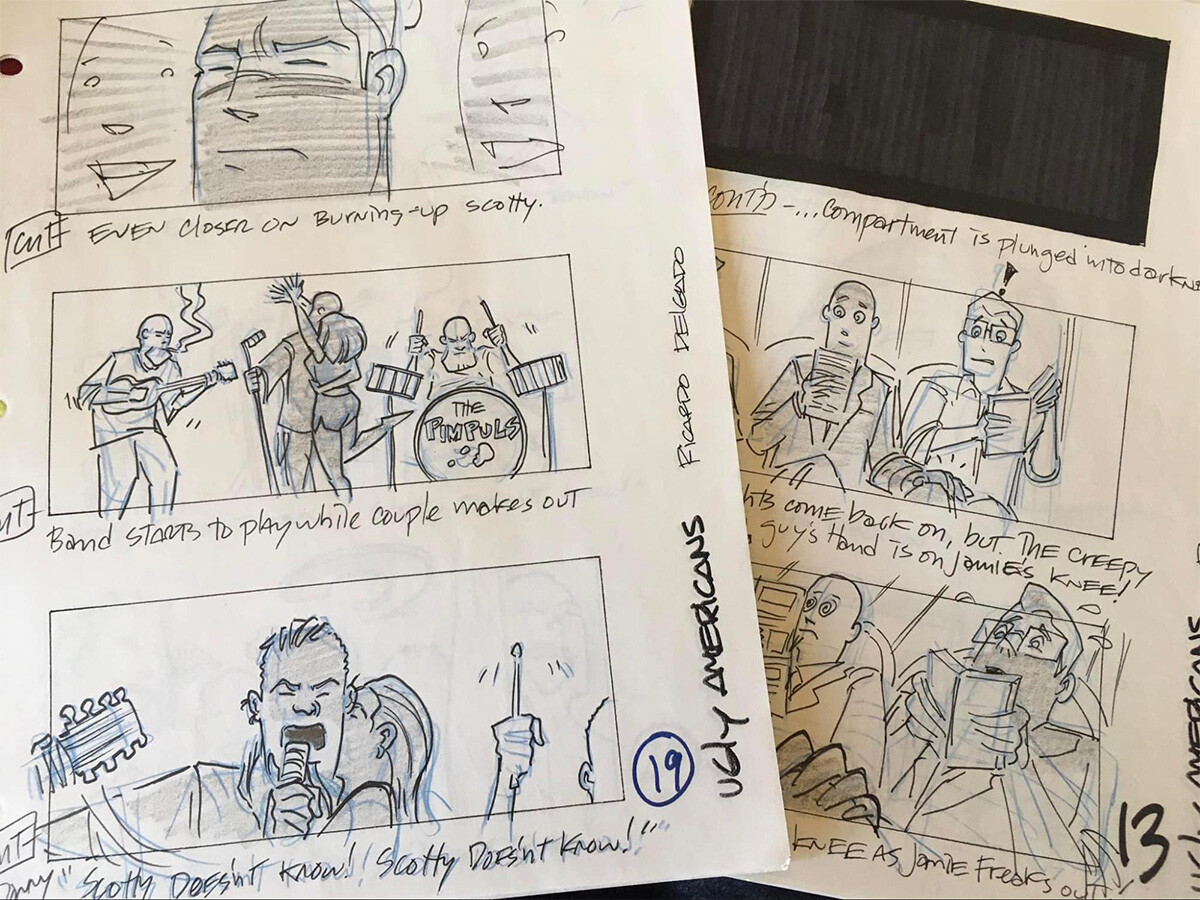
Vinnie Jones and the Double-Decker Bus
Berg: Vinnie Jones was one of the few names we got into the movie. He cost as much as 20 other people.
Schaffer: He was over 40 Berts.
Berg: He was hundreds of Berts. Well worth it though. He was super game. He’s a professional soccer player who is unbelievably associated with certain teams, but we were making him talk about how Manchester United was the best team ever. He was like, “This is hard for me, guys.” It’d be like hiring Derek Jeter to talk about how great the Red Sox are.
Schaffer: That bar we filmed at was just a bar in Prague. We called it “The Feisty Goat.” Again, we had a lot of issues with language barriers. So, we showed up to the location, and “The Feisty Goat” is misspelled as “The Fiesty Goat.” We kept blaming the Czech art department for it. Finally, someone said, “It’s that way in the script.” Turns out, we’d misspelled feisty the whole time.
The Robot Fight
Mandel: At one point, there was this idea that, in each city, we’d somehow cast real actors and comedy people from those cities. That plan was a disaster. Either everybody stunk, or in the case of the French, they were just offended and didn’t want to play the role.
Berg: We, as Americans, have these conceits of what Italian people are like, what French people are like, what German people are like. But Italian people, French people and German people don’t necessarily feel that same way about themselves.
Mandel: Ultimately, the French robot guy was played by J.P. Manoux from the Groundlings, and the Italian guy is Fred Armisen from SNL. We did end up with a few foreign stars, just not as many as we once thought.
As for the scene in Paris, the robot fight, that was one of the sequences of the movie that we’d actually bothered to storyboard because we had all these ideas about it. Then, of course, you get there and, to do what we storyboarded, it would be like, 11 setups. It was too much. Fortunately, it helped that J.P. Manoux already came with his own bag of tricks, and Scott had taken a mime class. I think Scott had been trained by the guy who played Barney. That saved us.
Crans sur Mer: The Nude Beach
Mandel: The Crans sur Mer train station was day one of EuroTrip shooting. It’s not a particularly significant scene, but it was momentous because we were going to be judged on the quality of those dailies by DreamWorks, as there were a few DreamWorks executives who came for the first few days of shooting. We did that shot with Cooper popping up into frame when he hears “nude beach.” That got a laugh, and it was a huge sigh of relief for us.
Berg: The nude beach itself was filmed in Rostock in former East Germany, very close to where Wernher von Braun’s rocket factory was.
Mandel: We got to that set still trying to figure out what we were going to do with the nudity. I remember us making a conscious decision that we weren’t going to do the Mike Myers version. We weren’t going to hide everybody with umbrellas and frisbees. I feel like it was on the beach where we had a discussion saying, “We’ve seen that joke; it’s bullshit. Let’s go for it. Let’s just have a lot of naked guys with penises flapping at you.” We’d never seen that anywhere.
Schaffer: I can’t believe all those genitals weren’t burnt to a crisp by the sun. You had a whole bunch of Nordic wangs and a long summer day. Those guys were troopers.
The Unused Anne Frank Scene
Schaffer: In the spec script, in Amsterdam, there was a different scene before the sex stuff with Lucy Lawless and the flűggåənk∂€čhiœβøl∫ên. Originally, Cooper is going out to look for a sex club, and he gets a flyer for a place called “The Secret Room.” He’s very excited to go to the secret room, and he’s looking around for it. He sees a line of people for this house, and he asks, “Is this the secret room?”
Mandel: People are also walking out of it, shaking and crying, and he asks them, “Were you in the secret room?” And they said, “Yes,” and he thinks this sounds incredible.
Schaffer: He goes in, and we tilt up and realize it’s the Anne Frank museum. He goes up, and there’s no one in the secret room except a mannequin of a girl. He figures the rest of the people will come soon, so he strips and waits. Then he realizes where he is, and some relatives of Anne Frank—
Mandel: Hold on. It was Tessa Frank, Anne Frank’s only living relative. It was a 100-year-old woman being pushed in a wheelchair.
Schaffer: He realizes “Oh shit,” and he doesn’t have any clothes on. He grabs the only thing he can to cover his genitals, which is that mannequin. So, when the door opens, it looks like he’s fucking Anne Frank from behind, and we just cut to police putting him back on the train.
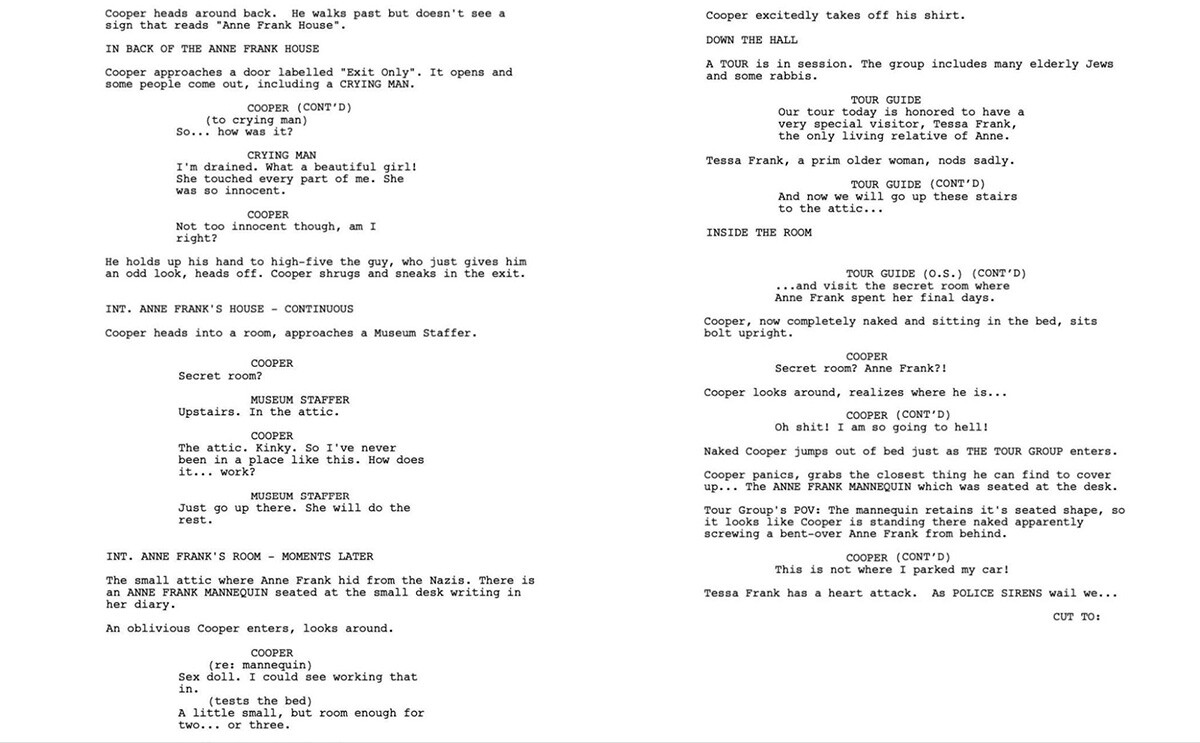
Berg: When DreamWorks bought the movie, that scene was this elephant in the room. We didn’t want to say anything or ask about it, and they hadn’t said anything about it. So we just kept proceeding as though it was okay. We actually got a couple of months down the road, and finally, because it’s DreamWorks, Spielberg read the script. He called us and said, “Guys, I think it’s really funny. I loved it. I have one note, and I’m sorry, but you have to cut the Anne Frank thing. I actually thought it was funny. I laughed. But, guys, my name is literally on that museum.” He was actually one of its biggest donors.
Schaffer: We heard him out and hung up. Then we said, “Fuck no!” We fought tooth-and-nail for it. At one point, between us, we flirted with taking it to New Line just to save this joke.
Berg: Ultimately, though, New Line said “no,” and we were like, “Fuck!” I remember Ivan Reitman telling us, “You’re out of your fucking minds. You have a greenlit movie here that they’re going to let you guys direct. You don’t know what the fuck you’re doing!”
Mandel: However, we fought to get our original script included on the DVD. Remember how they used to include scripts as a DVD extra you can read on the screen? We fought for that.
Schaffer: No, we just gave them that script because we knew that no one was ever going to read it.
The Little Girl Peeing in the Street
Berg: For Bratislava, we found this old Soviet airbase an hour outside of Prague. When the wall fell, they told 25,000 people to pack their shit, and they airlifted them all back to the Soviet Union. They abandoned this massive tract of buildings.
Schaffer: When we scouted it, it looked like shit — just like we wanted.
Berg: There was graffiti and broken windows. It was perfect.
Schaffer: Then, we got there on the day, and it was spotless. They told us, “We cleaned it up!” We were like, “What!?!? No!”
Berg: We spent a lot of money putting those apartments back to the way they were before they cleaned it up.
Mandel: There was a female production assistant from Bratislava who took great offense at the Bratislava depiction in the film. I have to say, I’m especially fond of the little girl that he waves to and she pees in the street. Was that in the final cut? I forget.
Berg: It’s in the end credits. I remember that was a particular lightning rod where the DreamWorks people were like, “You’ve got to get that fucking thing out of the movie. We will not have it. So, us, being contrarian assholes, said, “We’ll cut it,” then we put it in the end credits.
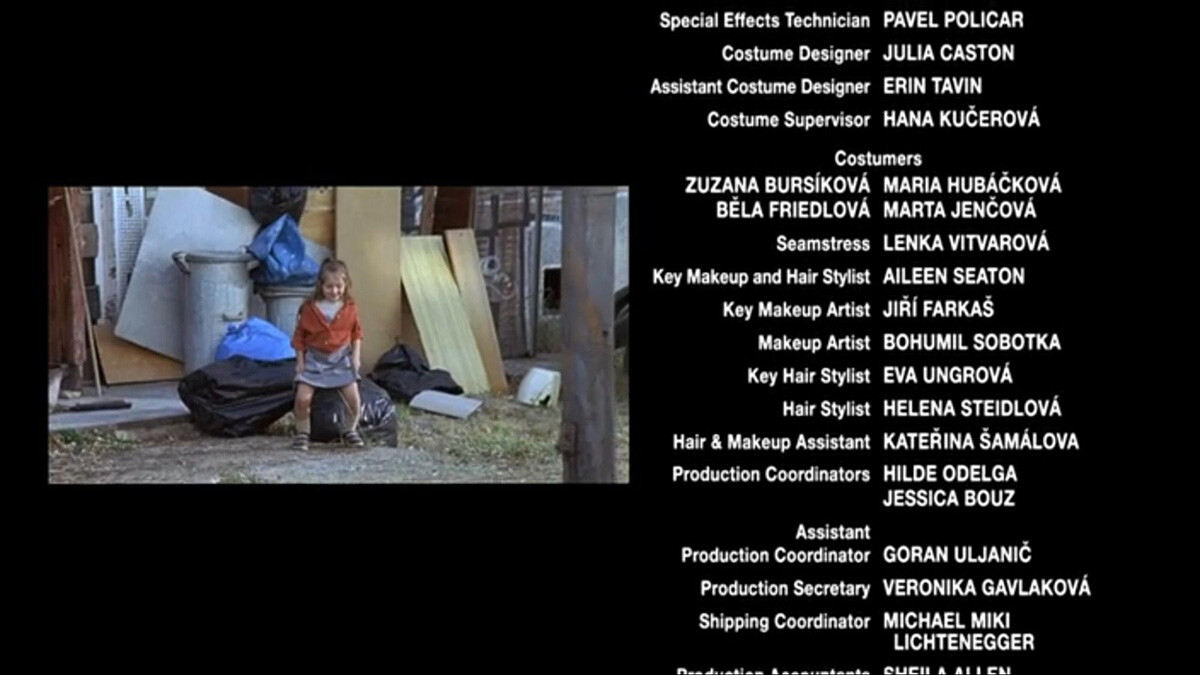
The Hitler Kid
Schaffer: I got to teach a four-year-old how to goose step. In the end credits, you can see me teaching him that, getting him a first-class ticket to hell.
Mandel: That’s Jeff pretending like he’s never goose-stepped before.
Schaffer: Look, if you’re going to do it, you do it right.
Berg: Thank God we were in Prague, because if we were in Germany, no one would have been comfortable shooting that.
The Vatican
Schaffer: We should also talk about how there was a different ending at the Vatican than what ended up in the movie. In our original ending, when Scott comes down from the Vatican, he tells Mieke, “I’m here.” She says, “Who are you?” But when we did our screening, it was a big energy downer.
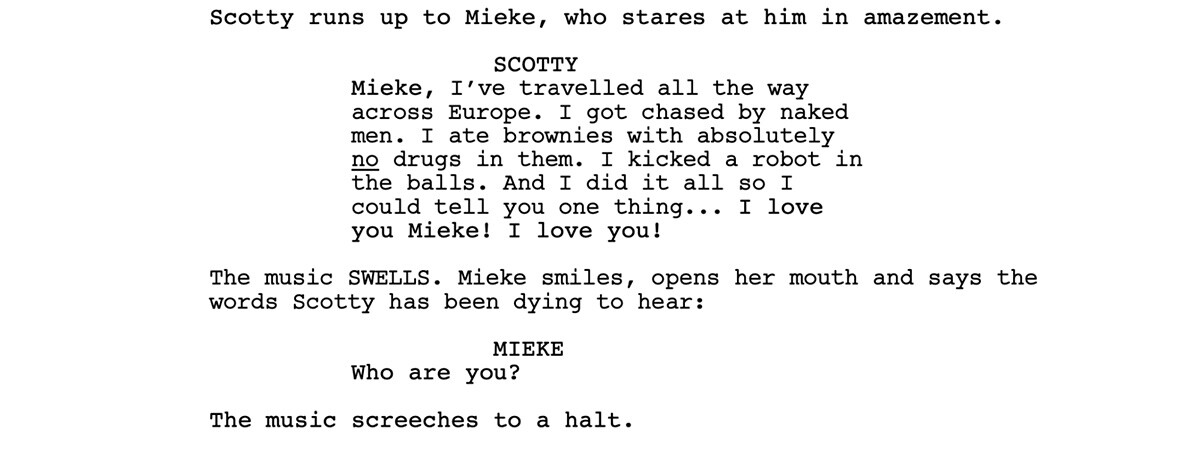
Berg: The math of the joke was very appealing to us. We thought it would be funny if he does all this, and she goes, “What?” Then when we screened it, the audience was like, “That sucks.”
Mandel: It literally killed the movie. She was still going to show up at the very end at his dorm, but that took like 20 minutes.
Schaffer: So we shot a different ending with them having sex in the confessional during reshoots.
Mandel: A lesson from that scene is something I still talk about with writers. I call it “The Humor of Disappointment.” It’s comedy writers getting too smart for their own good and saying, “You know how, in every movie, the guy and the girl get together in the end? Wouldn’t it be great if you watch a two-hour movie, and nobody gets together?” It’s basically giving the finger to the audience. It never works.
Berg: Sometimes the classics are classics for a reason. Boy gets girl affirming. Give them what they want.
Coming Back to America
Mandel: As we started editing the movie, it became apparent that the studio that made our movie fucking hated it. We’re not talking about them not liking this joke or that joke, we’re talking about this unfortunate sense that it was beneath them.
Berg: They thought this was a barnacle on the ass of their studio. Mike De Luca, who bought EuroTrip, was brought on to expand the scope of DreamWorks, but once he did that, there was this sense that he let in a bunch of derelicts behind their walls. DreamWorks didn’t like it.
Mandel: Things just got worse and worse throughout post-production. The definitive moment for me was when I said to Terry Press of DreamWorks, “Why did you make this movie?” and she said, “I don’t know.”
Schaffer: Ivan even tried to take the movie away from us and cut a PG-13 version of it.
Mandel: We watched that version once with Ivan, and it was so terrible that, when it ended, even he said, “Nevermind.”
Berg: I remember he said, “I mean, it was a valiant effort, right?”
Schaffer: He was not in our corner.
Mandel: He was in our corner at the beginning. He gave great comedy notes and directing notes in pre-production. But from the moment we started shooting, it felt like he wanted to kick us out of the directing chair and direct it himself. As for the PG-13 cut, that wasn’t a conversation with us. We walked in one day, and he was just doing it. It really sucked.
Berg: He was in a precarious position. His company had a deal at DreamWorks, and for him to curry favor, he had to get along with them. If he had to throw us under the bus to do that, there were places where I think he did that.
Schaffer: In post, the title became a recurring issue too. The basic thing when we came back from shooting was, “Let’s try to trick people into thinking this is a Road Trip sequel.”
Mandel: At one point, they were even talking about having Tom Green do a trailer for EuroTrip where he says, “Remember my friends from Road Trip? These are my new friends who go to Europe!”
Berg: I remember this meeting with the DreamWorks marketing people telling us what Road Trip’s opening box office was, what their eventual box office was, how many units of home video they shipped. They just kept talking about how much Road Trip was such a great piece of business for them. And we’re like, “Okay, what does that have to do with us?”
Basically, they thought, “If we can trick the audience into thinking this is a sequel to Road Trip, and if we can get 70 percent of the audience that movie had, that’s a win.” We quickly realized, “Oh, we’re fucked.”
Mandel: At some point, they scheduled a final test screening, and they more or less told us that, if we didn’t get above an 85 audience score, it wasn’t going to get released. We knew when they were going to test it, so we got one of the flyers recruiting the audience. We Xeroxed it and gave it to anyone we knew who was younger than us and wasn’t in the business. We gave it to a shitload of young Harvard Lampoon comedy writers who had recently moved out to L.A. and anybody else we knew who was young and wasn’t a comedy writer, an agent or a lawyer. We packed the audience with people that we knew and told some of the men to fill out that they were women. We told them “Don’t give it 100, but give it 90s and 95s.” After the screening, we went to some restaurant. They tallied it up, and we got over that 85. I remember the guy saying, “And we moved up in women, too!”
There was just one thing left: the name. They said, “We will release this movie, but you must change the title.” We reluctantly went, “Fine, call it EuroTrip,” which was a title cooked up in a petri dish by DreamWorks marketing. The irony is, Todd Phillips got pissed at us for the title. As if we thought it was the greatest idea in the world. We got it from both ends.
There are probably a million things, in hindsight, that I wish we could fix about EuroTrip, but number one above everything else is, I wish it was called Ugly Americans.
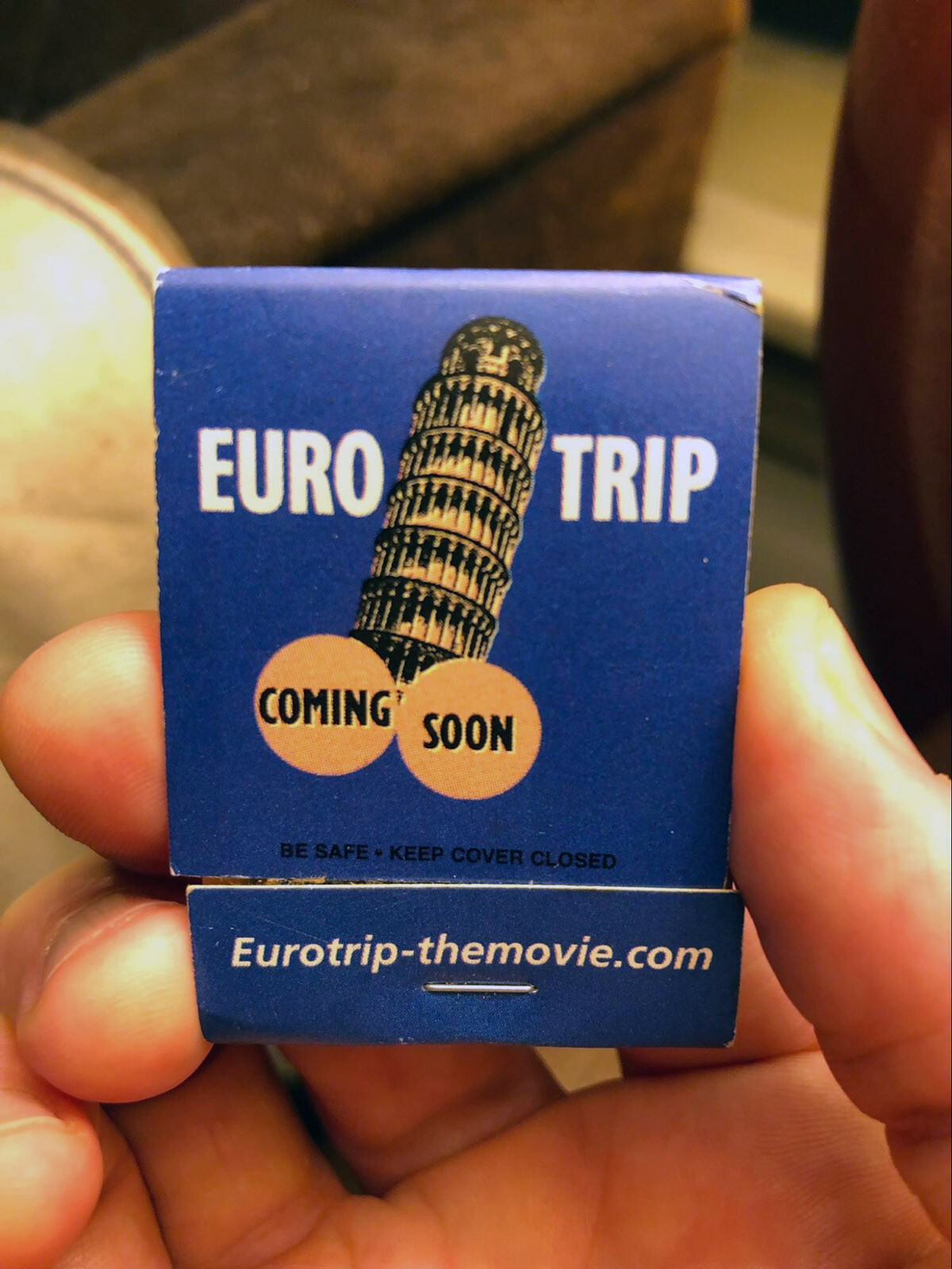
The End of the Road
Mandel: But hey, the marketing worked. We came in third that weekend behind the 11th week of 50 First Dates and Welcome to Mooseport.
Berg: And there was that Lindsay Lohan movie.
Mandel: We were fourth? I thought we beat them and that Meg Ryan boxing movie.
Berg: I feel like we beat Mooseport.
Mandel: No, we lost to Mooseport. I will stake my reputation on that!
Berg: I’m going to look it up…
Schaffer: Needless to say, it was a race to the bottom.
Berg: Okay, I just pulled it up. Number one that weekend was 50 First Dates. Number two was Confessions of a Teenage Drama Queen. Number three was the third week of Miracle.
Mandel: Holy shit.
Berg: Number four, Welcome to Mooseport.
Mandel: Holy shit. This is worse than I remembered.
Berg: Number five, EuroTrip. To our credit, we did beat the living shit out of the Meg Ryan boxing movie, Against the Ropes.
Mandel: I do remember that, on that Friday, by 10 a.m., we were dead in the water. It was deflating because it was over so quickly. When we were fighting with DreamWorks and losing, at least we were fighting. But then, on Friday morning, to be dead on arrival, it was deflating.
Berg: It was a gut-punch. When someone calls you and says to you the last two years of your life were kind of wasted, that’s brutal.
On the Road Again: ‘EuroTrip’ Finds Its Audience
Mandel: In the aftermath of EuroTrip, we tried to get other directing gigs, and people were saying things to us like, “Maybe you’ll direct a sample scene,” as if we’d never even made the movie. In a great way, it’s how we ended up at Curb Your Enthusiasm. Had EuroTrip never bombed, we never would have gone to Larry, who was looking for people to bounce ideas off of for Curb.
So we went away very quickly, but it was really “Scotty Doesn’t Know” that kept the movie going. Obviously, there was the DVD, where all the people who were too young to see it in theaters could now watch it. But it was “Scotty Doesn’t Know” that I heard was being played at proms by live bands and DJs. And now, on social media, “Scotty Doesn’t Know” and a handful of shots from EuroTrip are now memes.
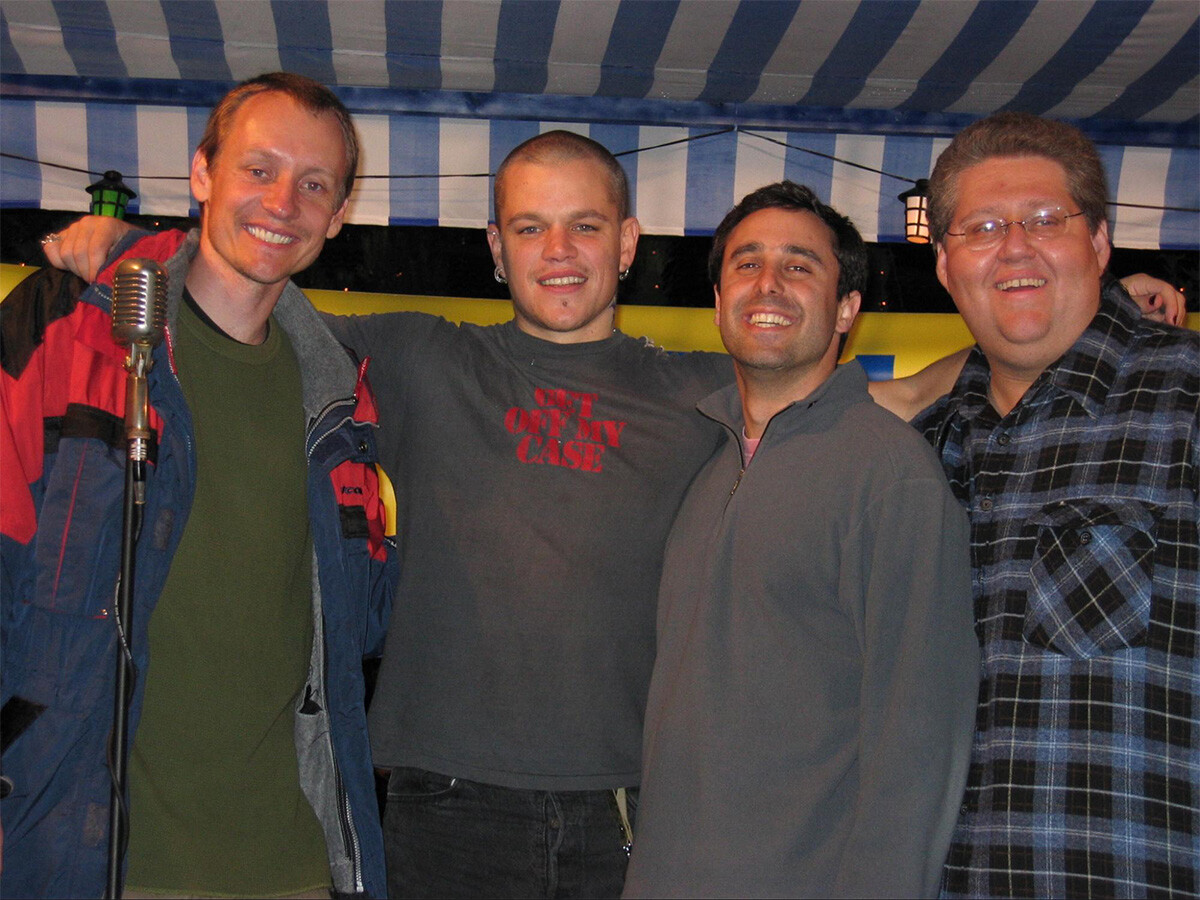
Schaffer: That and “Mi Scuzi” from Fred Armisen.
Berg: And there’s “Mail Motherfucker.” That’s a drop used on Howard Stern. They still use it all the time, whenever he’s reading email from listeners.
Berg: People call EuroTrip a “cult hit,” but you don’t set out to make a cult hit. You set out to make a blockbuster. Below that there’s “kind of a hit,” then there’s “sort of okay,” then there’s “cult hit,” followed by “total bomb.” A cult hit is just one step above a total bomb, but it has to be a total bomb first for that to happen. It takes a while for the soup to cure and become a cult hit.
Schaffer: The interesting thing is, because it took that journey, the generation that watched it, watched it in their basements, like the movies we watched.
Mandel: Sure, we would have liked the giant blockbuster, but at this point, I’ll take it.